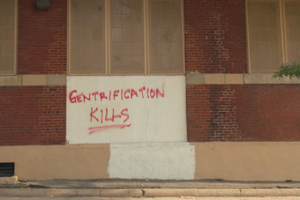 Every morning I walk to my job -- from my neighborhood that sits on a hill along the edge of Howard University's campus into the heart of Columbia Heights. Today, as I turned onto Harvard St., I came across a message spray painted on the wall of the Alliance for Concerned Men: "Gentrification Kills." The words were in red. "Kills" was underlined. The message turned my stomach. As I write this post I still feel ill.
Every morning I walk to my job -- from my neighborhood that sits on a hill along the edge of Howard University's campus into the heart of Columbia Heights. Today, as I turned onto Harvard St., I came across a message spray painted on the wall of the Alliance for Concerned Men: "Gentrification Kills." The words were in red. "Kills" was underlined. The message turned my stomach. As I write this post I still feel ill.
Gentrification. I know the definition of this word. I've heard it enough times. But it's not just an abstract concept. It's what I'm living in. And though I'd like to believe that I'm not a part of it, I realize that my brown skin and natural hair doesn't automatically mean that I'm not playing a role in the slow "death" of this neighborhood. In the two years that I've lived in DC, I've come to understand gentrification as a process in which progress disrespects what pre-existed. Gentrification screams profit over personality, new without adequate regard for the old, and in my neighborhood, white vs. black. Residents who are native to DC recall a time before the high rise luxury condos, wine bistros, and foreign practice of passing folks on the street without saying 'hello' moved into the area.
The image displayed on the wall makes me feel guilty and ultimately like an outsider. What happens when you don't fit the dominant demographic but you're not willing to leave because of it? What happens when it feels as though no one belongs here anymore? I'd like to believe that this "writing on the wall" is evidence that some of us have failed to be true neighbors and that we've failed to intentionally integrate each other in our lives.
Sunday's gospel reading from Luke 10 is the well-known parable of the Good Samaritan. Jesus ends the parable saying, "Go and do likewise." The battered man on the side of the road is your neighbor. Be compassionate. Take time to care for those who cross your path.
Today, I wonder about the wounds that are hidden on the inside. I think about the injuries that exist in the hearts of my neighbors. I think about the psychological and emotional wounds that the battered man along the side of the road must have had in addition to his physical wounds. I imagine the man engaging with the innkeeper and learning about how he'd been attended to by the Good Samaritan. When the news of what this Samaritan had done was first learned, I believe the injured man began to heal on the inside -- an intimate and internal curative process was initiated.
As Christians called to love God through the outward expression of our lives, I fear that we often find ourselves wounding those around us in invisible ways. Christ calls us to show mercy -- to set out each day with an aim to bless someone else. Perhaps we will be brave and start the healing process by engaging. We can start by considering a simple question: How can we be a good thing in the lives of strangers around us instead of a toxic presence?
Got something to say about what you're reading? We value your feedback!
